

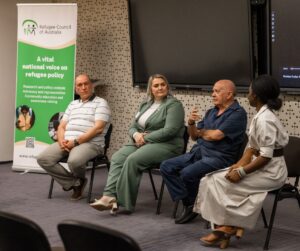
Mercy Works was honoured to join the Refugee Council of Australia’s AGM and the launch of Australia’s Untold Stories — marking an incredible milestone: one million refugees resettled through Australia’s humanitarian program since 1947.
A moving panel shared the journeys of Carlos (Chile), Mirsada (Bosnia), and Naseer (formerly stateless) — just three of the countless stories that have shaped and enriched our nation.
Together with Senator Paul Scarr, RCoA Board, sector colleagues, and passionate advocates, we celebrated resilience, contribution, and the ongoing work to build a more compassionate Australia.
#MercyWorks #RefugeeCouncil #AustraliaUntoldStories #RefugeeSupport #HumanitarianProgram #CompassionInAction #OneMillionStories

Recalling a Visit to Bihute Women’s Prison, Papua New Guinea
“During a visit to Papua New Guinea, Maryanne Kolkia rsm and Theresia Boyek rsm invited me to accompany them on their weekly visit to the women’s prison, where they held discussion groups and assisted [the women] in various craft activities. The atmosphere that was engendered in this session was extraordinary – a deep sense of gratitude and admiration from the women prisoners responding so delightfully to the compassion and skills of the Mercy women. I sensed that a partnership such as this was at the heart of Mercy Works and such memories often sustained me during those privileged years when I was Chair of the Mercy Works Board”.
– MARY DUFFY rsm RIP, Board Chair 2008-2011
In May, Mercy Works – in partnership with the Diocese of Kundiawa in Simbu Province, Papua New Guinea – undertook an ambitious project to install water tanks into 14 schools in just 28-days. Now hundreds of students, teachers and staff have much improved access to clean water for drinking, handwashing, cooking and cleaning.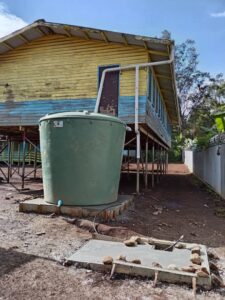
Water and sanitation related diseases are one of the leading causes of death for children under five years in PNG. Sadly, preventable illnesses resulting from inadequate water, sanitation, and hygiene practices claim the lives of children daily.
Prior to the installation of the new water tanks, students were required to carry their own water to school. They were often sourcing water from unreliable and unclean water sources such as rivers. Some schools were relying on old water tanks supplying poor quality water due to decay, algae growth and sediment buildup.
Mercy Work’s newly installed water tanks are expected to decrease the prevalence of waterborne diseases in these 14 school communities. Handwashing stations encourage the teachers to teach children good handwashing and sanitation practices.
For most schools, the water tank installation is the first significant building and maintenance update to the school in over 50 years. Happy, healthy children correlates with an increase in school attendance and improves a student’s ability to focus on their studies.
‘Access to reliable, safe water is a basic human right and we are passionate about the tangible health benefits of safe water for everyone. Mercy Works partnered with the Diocese of Kundiawa to identify fourteen local schools that would greatly benefit from a rainwater harvesting and storage system.’ Says Andrew Lowry, Overseas Project Coordinator, Mercy Works.
With a group of local tradesmen, the installations began in early May and by mid-June all fourteen schools were equipped with operating water tanks.
Each water tank system includes guttering to collect the rainwater from the roof, a ‘first flush diverter’ to collect debris from the initial downpour and a disabled-accessible tap point for water collection.
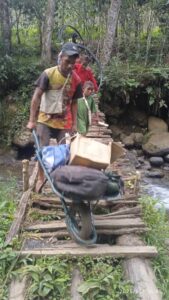
The team of six skilled tradesmen delivered the necessary hardware and installed the tanks in some very challenging locations. This included having to physically carry supplies across rivers and through terrain impassable to vehicles. Terrain so challenging that the local communities helped to carrying in the materials to ensure timely installation of the water tanks.
‘We are so encouraged by the success of this initial water tank installation project that we intend to install more water tanks in Simbu over the next 12-months. We couldn’t have achieved this work without the support of our incredible Mercy Works donors.’ Says Andrew.
Mercy Works has been active in PNG for more than 19 years and is currently conducting projects in two comparatively remote locations in Western Province and in the highlands of Simbu Province. In Simbu, Mercy Works has conducted livelihood and training projects to improve the financial situation of local people. This has included the establishment of the ‘Leave No One Behind’ micro financing program through the creation of small village savings and loans collectives.
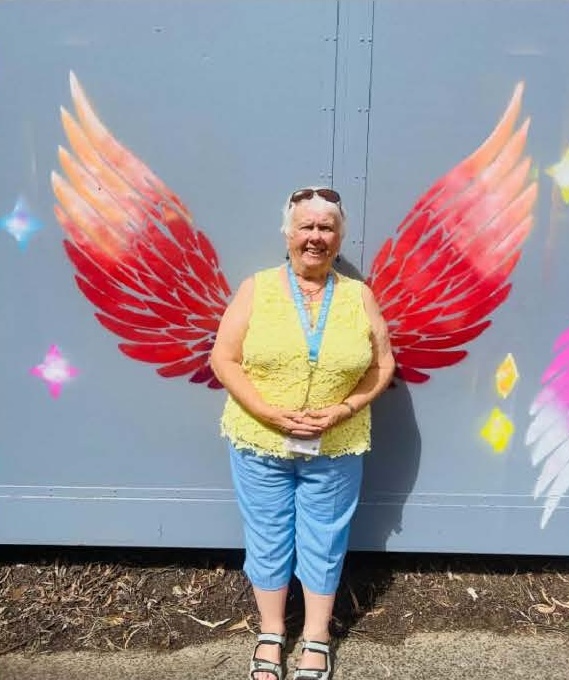
When Lorraine Manning steps into the bustling corridors of the Bankstown Intensive English Centre (BIEC), there’s a sense of purpose about her. The former maths teacher, who once spent decades guiding Australian high school students through equations and problem-solving, is now doing something just as important – helping newly arrived refugee students take their first confident steps into a new life.
Lorraine’s journey to becoming a dedicated Mercy Works Connect volunteer began not with a plan, but with a heart for service and a belief in the transformative power of education.
“I really believe that education is the key to success in life,” she says. “So, helping young people achieve their best, especially when they’ve already faced so much, is something I care deeply about.”
Born and raised in Sydney, Lorraine’s roots are part Australian and part English, her father having immigrated to Australia in 1911. Though English is her native language, she also studied French, German, and Latin at school, and even picked up some Italian before a trip abroad. Her love of learning languages and cultures makes her a natural fit at BIEC, where students from countries like Syria, Afghanistan, Myanmar, and Sudan are learning English as they find their footing in a new country.
Lorraine first came to volunteering after retiring from a long and successful career in education. Her first job was as a librarian at the State Library, a role she took on after earning a science degree and winning a scholarship. But it wasn’t long before her passion for teaching took over. In the 1980s, she returned to university to become a qualified maths teacher, a profession she held until her retirement in 2010.
But Lorraine wasn’t ready to stop helping others.
“I started volunteering with Sudanese refugee students after I retired,” she recalls. “Then I worked with Syrian refugees at a private high school in Granville. Eventually, a friend encouraged me to join her at Bankstown IEC. She said it was a great place… and she was right.”
BIEC is a unique space, a dedicated intensive English centre within a high school, where newly arrived students spend up to four terms immersed in language learning. Lorraine quickly became a familiar face there, supporting classroom teachers and students alike, not just in English, but in maths too, her specialty.
Surrounded by teachers and support staff, Lorraine says “It is such a warm and inviting place. The students are delightful. They’re keen and really impressed that someone would come… for nothing… to help them settle into Australia. It’s a great place to work. I’d invite anyone to volunteer in the same way.”
The role Lorraine plays in helping with basic lessons, explaining tasks and encouraging students, may sound simple, however is profoundly meaningful. Many of the young people she supports have come from traumatic backgrounds. For them, adjusting to a new country, a new school, and an unfamiliar language can feel overwhelming. But having someone like Lorraine in the classroom, week in and week out, offers stability and hope.
Ask Lorraine what brings her back every week, and she’ll smile warmly: “I get a lot of joy from working with the kids. Seeing them grow more confident, watching their language skills improve… it’s incredibly rewarding. And the staff here? They’re wonderful… cheerful, supportive, and completely dedicated to their students. It’s an honour to be part of it.”
Outside of volunteering, Lorraine leads a full and vibrant life. She enjoys knitting, quilting, and staying active by going to the gym. But it’s clear that volunteering has become more than just a hobby for her, it’s a calling.
At a time when Australia is celebrating National Volunteer Week with the theme Connecting Communities, Lorraine’s story is a shining example of what that really means. Through patience, compassion, and a willingness to give her time, she is helping young people build the foundation for a better future. And in doing so, she’s strengthening the very fabric of our community.
Her message to others thinking about volunteering is simple: “If you’ve got a little time and a lot of heart, this is one of the most meaningful things you can do. You don’t need to be a teacher. You just need to care.”
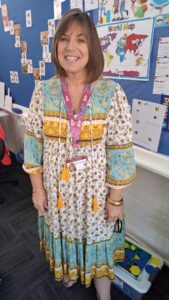 Once a week, a subtle kind of magic happens in a brightly lit classroom at Dianella Primary School in Perth.
Once a week, a subtle kind of magic happens in a brightly lit classroom at Dianella Primary School in Perth.
There, amid a swirl of phonics flashcards, sing-song days of the week, and children calling out answers in accents shaped by distant homelands, sits Helen, a woman with no formal teaching background, but a heart big enough to span continents.
Helen volunteers in a class in the school’s Intensive English Centre, a safe and supportive space – even more so for children newly arrived in Australia. Some of these students have lived in refugee camps. Others may have spent long stretches in transit or detention. Most arrive with little or no English. But they bring with them resilience, spirit, and a desire to belong. And for many, Helen is one of the first people in this country to help them feel that they do.
“I get so much joy from working with the kids,” Helen says simply, when asked why she keeps coming back.
And the kids? When asked recently what Helen does for them, the response was instantaneous, and unanimous.
“A lot!” said 14 young voices in perfect chorus.
Helen is part of the Mercy Works Connect WA program, a volunteer-driven initiative supporting refugee and asylum-seeker children in schools. While she never trained as a teacher, her impact is undeniable. Glenda, the classroom teacher she supports, puts it this way: “She deserves an honorary teaching degree.”
In the Reception class, Helen works with students from all over the world: Syria, Afghanistan, Iran, China, Vietnam, India, Bhutan. Their first languages include Arabic, Dari, Tamil, Cantonese, and Burmese. But what unites them is the challenge of navigating a new language and a new life.
Helen helps bridge that gap.
A typical morning with the students starts with learning the basics of everyday conversation: the days of the week, months, seasons, greetings. These simple words are steppingstones to confidence and connection. From there, the lessons shift to phonics, vocabulary-building, and reading practice – always with visual aids, physical movement, and patience woven throughout.
Helen moves between small groups or sits beside individuals who need extra support. She adapts in the moment, explaining things in ways that click for each student. Sometimes it’s drawing pictures. Sometimes it’s repeating a word until it feels like a friend.
“She just gets it,” says Glenda. “She knows when a child needs a hand, a smile, or a moment of encouragement. Her calm and consistency bring a sense of security to the room.”
But Helen’s role goes beyond language. By showing up, week after week, she offers something even more powerful: belonging. In a world that can feel overwhelming for newly arrived children, she is a steady, reassuring presence and someone who sees them not as their trauma or their broken English, but as bright, capable learners with stories worth hearing.
Helen reflects humbly on her work: “I feel the program is a very effective way of providing support to the students and the school. The Intensive English Centre staff are an amazing group of teachers, and it’s wonderful to be part of what they do.”
She’s not in it for recognition. She’s there because she knows, intuitively, what Mercy Works has always believed – that connection is everything.
Now in its 25th year, Mercy Works continues to stand beside some of the most vulnerable members of our community and volunteers like Helen are the heartbeat of that mission.
The children she supports may not remember the spelling drills or the worksheets in years to come. But they will remember her kindness, her encouragement, and the way her eyes lit up when they got something right. They’ll remember that someone cared enough to sit beside them as they found their footing in a new land.
Helen’s story is a quiet one. There are no grand speeches, no dramatic breakthroughs. Just the slow, steady work of building trust, week by week, word by word.
And sometimes, that’s exactly the kind of story we need.
Because what she does, and what all Mercy Works Connect volunteers do, is simple but extraordinary.
She shows up. She listens. She believes.
And to a classroom full of children finding their voices, that means a lot.
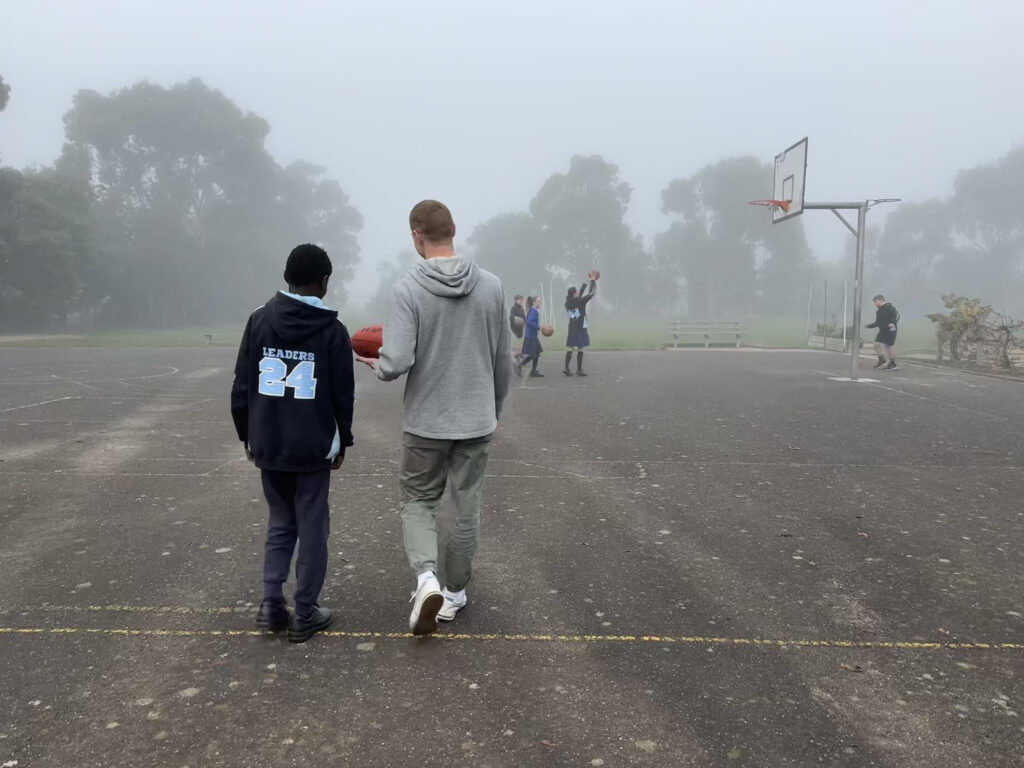
In 2018, Michael had just relocated to country Victoria with his wife for what was meant to be a temporary 12-month stay. A primary school teacher by background and a digital wellbeing educator by trade, Michael found himself with some extra time on his hands as he launched a new business. Wanting to use that time meaningfully, he turned to the local council website in search of volunteer opportunities. That’s where he discovered Mercy Works Connect and unknowingly, the start of a life-changing journey.
“I loved the idea of supporting a young person in a school setting,” Michael recalls. “It really resonated with me as an educator, and it was a way I could give back to the community in a very personal way.”
Michael was matched with Jamal, a bright, kind-hearted prep student whose family had migrated to Australia from South Sudan. Though born in Australia, Jamal faced significant challenges with reading and writing, and had been identified by his school as a student who would benefit from one-on-one support. Michael began visiting the school once a week to spend the morning with him.
That was six years ago. And despite moving cities twice, first to Melbourne and then to Sydney, Michael never stopped connecting with Jamal.
“Volunteering with Mercy Works Connect has been one of the most meaningful things I’ve done,” he says. “During the pandemic, the school helped facilitate weekly video calls so we could keep our sessions going. That continuity has made all the difference.”
Each weekly visit is structured around Jamal’s needs, both academic and emotional. Michael arrives at 8:50am, has a quick check-in with the teacher to understand what Jamal is working on, and then spends the next two hours together chatting, reading, writing, playing games, and helping Jamal stay engaged with his learning.
“We always start with a conversation,” says Michael. “How was his week? What were the highs and lows? Then we dive into whatever learning task he needs support with — reading, writing, sometimes maths. And we always make time for a brain break, usually kicking a soccer ball or shooting hoops. It’s about building trust as much as it is about literacy.”
That trust has paid off. Now in Grade 6, Jamal’s reading and writing have improved significantly, but more than that, his self-belief has grown.
“When we started, Jamal struggled to see himself as a capable learner,” Michael explains. “But over time, we’ve worked on building his confidence in the classroom, in friendships, and in how he carries himself. We talk a lot about problem-solving and navigating challenges. It’s been amazing to see that transformation.”
One of Michael’s proudest moments came recently when Jamal was preparing to deliver a leadership speech to his peers and teachers – something that would have been unthinkable just a few years earlier.
“We spent that morning practising his speech together,” Michael smiles. “He was nervous, but he did it. That was such a huge milestone, and it reminded me how powerful consistent encouragement can be.”
Jamal’s teachers have also acknowledged the difference that this one-on-one time has made. While the school offers its own small-group literacy interventions, the personalised and sustained support Michael provides through Mercy Works Connect adds a deeper layer of care.
It’s not just Jamal who’s benefited. Michael says the experience has impacted him just as deeply.
“I’ve learned so much from this journey… about patience, commitment, and how powerful showing up can be,” he says. “Volunteering doesn’t have to be a grand gesture. One morning a week can change someone’s life. It’s certainly changed mine.”
Now celebrating its 25th year, Mercy Works continues to connect volunteers like Michael with young people who need encouragement, support, and belief. Through programs like Mercy Works Connect and MPower, the organisation is helping vulnerable learners across Australia find their footing, their voice, and their potential.
For anyone considering volunteering, Michael offers simple advice: “Just start. You never know the difference one person can make — and the connection you’ll build could stay with you for a lifetime.”
*Names changed to protect identities.
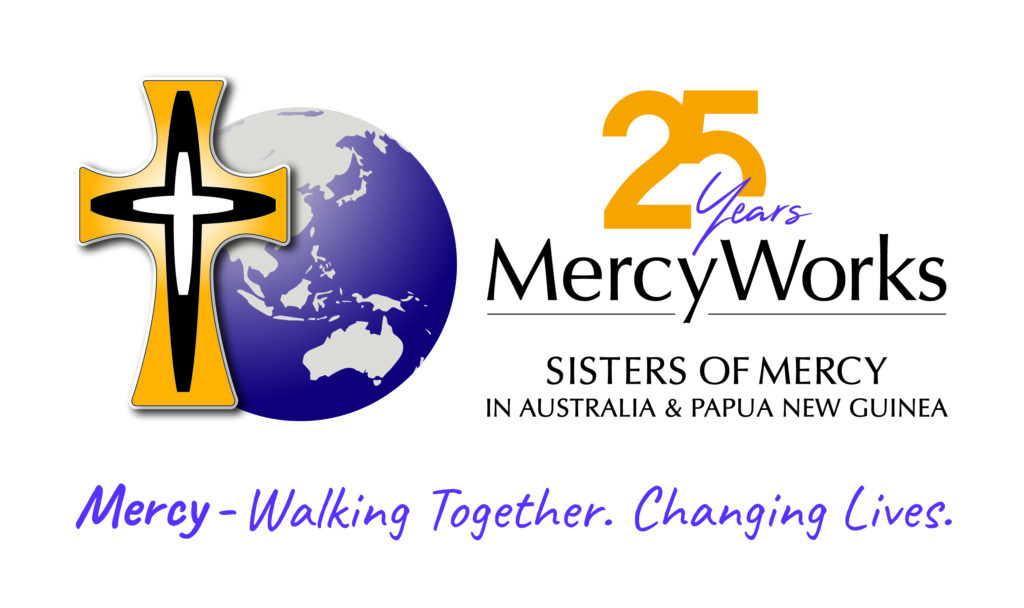
‘The poor need help today, not next week.’
– Catherine McAuley. These words have been the guiding mantra for all who have contributed to Mercy Works since its inception. In 2025, we celebrate 25 years of Mercy in action and reflect on a legacy of service, innovation and dedication.
Since arriving in Australia in 1846, the Sisters of Mercy, alongside others inspired by Catherine McAuley’s vision, have committed themselves to walking with the most marginalised and vulnerable in society. In 1993, a desire to formalise this commitment led to the establishment of Mercy Overseas Aid. Recognising the need for clear principles to guide both national and international ministries, the organisation as we know it today, was renamed Mercy Works Inc. in April 2000.
Ailsa Mackinnon rsm, former Executive Director of Mercy Works recalls ‘In the beginning it was extremely difficult because we were so vulnerable financially but the work being done was magnificent. No government funding meant fundraising needed to have a solid commitment from foundations, private donors and importantly our Mercy schools, to ensure the mission was sustainable.’
By 2003, a Board of Directors was formed, and in 2004, Mercy Refugee Services was fully integrated into Mercy Works. As the number of programs with tax-deductible funding continued to grow, Mercy Works applied for Public Benevolent Institution status, transitioning to a Company Limited by Guarantee in July 2010.
‘We knew that we were making a difference. It was tangible. You could see it in people’s lives.’
– Ailsa Mackinnon
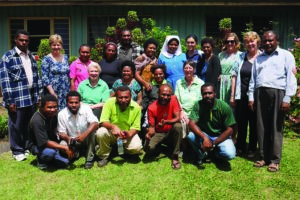
From the onset Mercy Works aimed to evolve earlier works designed to improve social justice and selfreliance through education, health care and welfare programs. These grew to encompass 11 countries from Australia to Kenya, from Pakistan to Papua New Guinea (PNG) and from Peru to Timor-Leste. For Ailsa, ‘Mercy is a verb. It is action.
It is how you put your faith life into action.’ Projects included the installation of water systems in remote villages of Timor-Leste and PNG. Groups were formed to support and empower women, and advance maternal health outcomes, in Pakistan, Kenya and Peru. In Timor-Leste and PNG courses were offered to give women and men the skills required to find work to sustain themselves.
Keen effort was afforded to programs that focussed on elevating educational outcomes for people from a refugee or asylum seeker background in Australia, through the creation of Classroom Connect in 2008 (now called Mercy Works Connect). The mission to create educational opportunities extended to Pakistan with assistance to two schools, and Sudan where in partnership with other NGOs, Mercy Works built a hostel to house young female students attending secondary school. In PNG, hundreds of students benefitted from the Access to Tertiary Education Scholarship program.
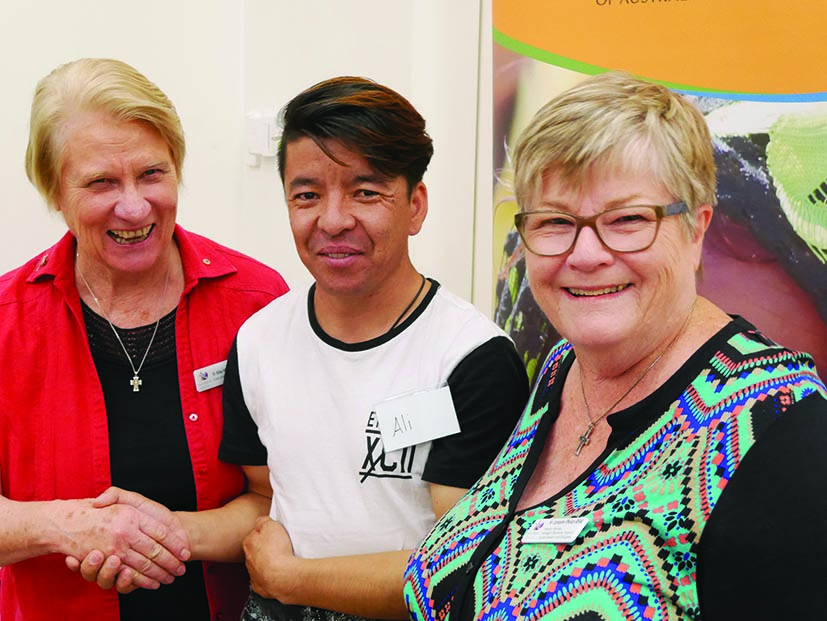
Ailsa believes ‘The turning point for Mercy Works was our partnership with local communities. That grassroots approach allowed us to design programs that truly met the needs of the people we served.
Former Board Chair, Kathleen Donnellon adds ‘For me it was that sense of bringing it back very firmly to mission all the time, making sure that the things that we were funding were in collaboration with the people that we were working with, whoever they might be, that it was really mission based in the sense that it was working towards sustainability for that community or that organisation.’
This is evident in the current work across Australia, PNG, Timor Leste, and the Philippines.
In Australia, Mercy Works partners with organisations like Baabayn Aboriginal Corporation to provide weekly gatherings for Indigenous mothers and children, Jtunga Wattyjara ‘Family Together’ is dedicated to advancing better outcomes for Indigenous women and families, and the Nallei Jerring Youth Leadership Program fosters leadership and self-identity among Aboriginal youth.
Mercy Works Connect supports child and adult students from a refugee or asylum seeker background with mentoring and academic assistance. Mercy Works also supports asylum seekers in Brisbane finding employment through the Romero Centre.
In partnership with the Diocese of Daru-Kiunga in PNG, Mercy Works supports West Papuan refugees and enhances living standards in Simbu Province through financial services, skills training, and crop production.
Mercy Works collaborates with the Hospitaller Sisters of Mercy in Timor Leste, to combat malnutrition in Maucatar, with a focus on pregnant women and children.
The Teresa Orsini Maternity Clinic plays a key role in improving health outcomes in this underserved region.
Alongside the Good Shepherd Home in The Philippines, Mercy Works supports survivors of gender-based violence, offering refugee, rehabilitation, and livelihood opportunities.
As we look to the future, we remain committed to further empowering these communities and building on the sustainable progress that has been made. Mercy Works Board Chair Joe Zabar’s aspiration is ‘I’m hoping that we have tilled the soil well enough so that the next generation coming through will be able to harness some of the gains that we’ve achieved and then springboard Mercy Works to even greater things in the next 25 years.’
Mercy Works began with a vision for a better world, and 25 years later, that vision is stronger than ever. From humble beginnings, the organisation continues to be a force for change. Joe concludes ‘We may have grown but we’re still a small organisation, and nimble, and I don’t think we’ll ever change that because it’s grassroots and it’s sustainable, in the sense that individuals can take control over their own lives. That’s our niche. We might be too small to change the world, but we can change the world for those we support.’
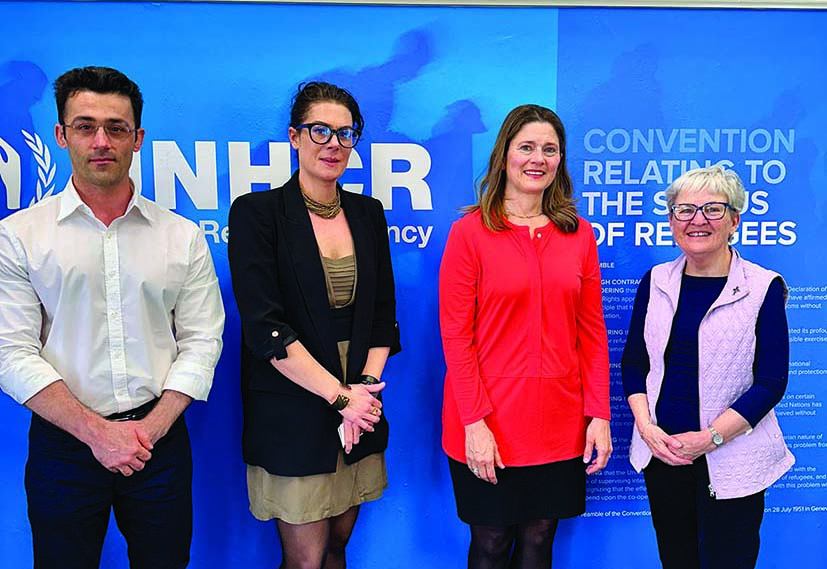
Executive Officers
Helen Nolen rsm 2000 – 2003
Maryanne Loughry rsm 2004 – 2005
Rosemary Carroll rsm 2006 – 2011
Executive Directors
Ailsa Mackinnon rsm 2012 – 2018
Sally Bradley rsm 2019 – present
Board Chairs
Patricia Pak Poy rsm 2000 – 2002
Mary Densley rsm 2003 – 2007
Mary Duffy rsm, RIP 2008 – 2011
Berice Livermore rsm 2012 – 2017
Kathleen Donnellon 2018 – 2021
Joe Zabar 2022 – present
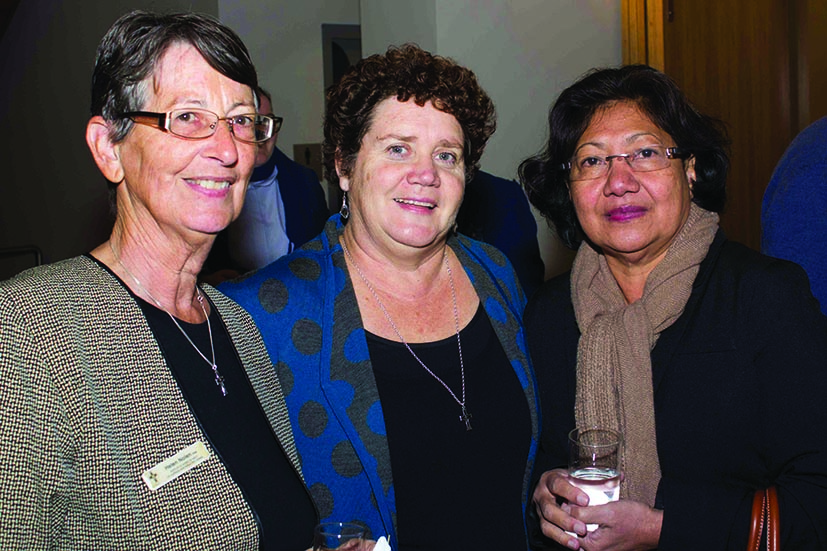

Are you new to Australia and want to better understand your rights and opportunities within the Australian legal system?
Mercy Works, DLA Piper and the Afghan Women Support Association are hosting a FREE 4-week course designed to help refugees and people seeking asylum gain the knowledge and confidence to thrive in their new home.
When: Fridays – 2, 9, 16, and 23 May 2025
Time: 12:30 PM – 3:00 PM
Cost: Absolutely FREE!
Lunch Provided.
What You Will Learn:
✅ Australia’s Legal and Government System
✅ Starting a Business in Australia
✅ Tenancy Rights – Know Your Housing Rights
✅ Human Rights in Australia
Afghan Women Support Association provides information, referral, and practical support to migrants and refugees from Afghanistan and other countries.
DLA Piper is a global law firm with offices in over 40 countries, advising businesses on a wide range of legal matters. DLA Piper’s pro bono mission is to pursue justice in our communities and around the world by advancing gender and racial equality, advocating for children, and combating hunger.
Mercy Works is the development arm of the Sisters of Mercy in Australia and Papua New Guinea. We partner with local communities and organisations in Australia, Papua New Guinea, Philippines and Timor-Leste to build capacity, dignity and self-reliance.
This April, as we celebrate 25 years of Mercy Works, I am grateful to share this journey, and my Easter reflections of hope, with you.
I draw inspiration from a recent visit to our project in the remote mountainous area of Maucatar in Timor-Leste. Almost half the population of Maucatar live on less than US$2.15 per day. Life is challenging and malnutrition is prevalent. Yet the Timorese people I met, express great joy, resilience and gratitude.
Thanks to kind supporters, people like you, Mercy Works* launched a small but impactful initiative ‘the chicken and egg project’ six years ago. We provide families with nutrition through sustainable poultry farming. Today, it has expanded, reaching even more villages.
I met with Village Health Volunteers dedicated to improving basic health care. There is still an urgent need for clean water and sanitation – basic human rights. Mercy Works has installed a water tank in one school, and with your generosity, we hope to bring water and sanitation to more communities.
Income-generation projects are thriving – especially among women – raising chickens, farming fish, growing vegetables, and weaving. These endeavours provide dignity, self-sufficiency, and the means to support their families.
I hope you too are inspired by the people of Timor-Leste. If you would like to help vulnerable communities such as those living in Maucatar, please give now.
May Easter blessings of hope be with you and your family, and may God’s grace surround and uplift you.
With thanks,
Sally Bradley rsm
Executive Director